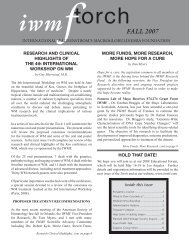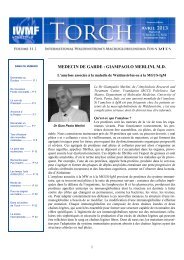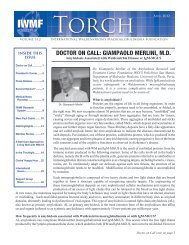English - International Waldenstrom's Macroglobulinemia Foundation
English - International Waldenstrom's Macroglobulinemia Foundation
English - International Waldenstrom's Macroglobulinemia Foundation
You also want an ePaper? Increase the reach of your titles
YUMPU automatically turns print PDFs into web optimized ePapers that Google loves.
From IWMF-Talk, cont. from page 16<br />
If one is an MGUS patient, these low levels do correlate with<br />
increased chance of progression to WM.”<br />
Dr. Tom Hoffmann wrote that Rituxan has a long-term<br />
effect on all our immunoglobulins. Rituxan kills all memory<br />
B cells, and, although it does not kill current plasma cells,<br />
it does prevent the formation of new plasma cells. All Ig’s<br />
typically decrease after Rituxan, and for many patients Ig’s<br />
may never return to their pre-Rituxan levels.<br />
Michael Toms wrote that he has received IVIg infusions<br />
once a month for four years. Gone are the sinus infections,<br />
shingles, sore throats, infected skin lesions (e.g., a cat<br />
scratch), “sniffles” – and more – that Michael suffered all his<br />
life. He now sees what a “normal” immune system is like.<br />
The changes occurred after the first infusion. If he notices<br />
the start of a sore throat, a “scratchy” feeling that, in the past,<br />
used to be the harbinger of a full bore cold with bronchial<br />
involvement, he now deals with it by the “donated” IgG<br />
within 48 hours and calls the results “amazing.”<br />
Ann Fried adds that her fiancé, age 74, has been receiving<br />
IgG infusions every 6 weeks for more than 3 years. Prior to<br />
that he had been getting repeated bronchial infections the last<br />
of which morphed into pneumonia. These repeated infections<br />
are what led his primary care physician to have his IgM<br />
level checked, leading to the WM diagnosis. Since his IgG<br />
infusions he has no longer had infections or side effects from<br />
the infusions themselves. He is pre-medicated with Benadryl,<br />
Decadron, and Tylenol.<br />
Bob Reeber wrote that his hematologist indicated that<br />
the long-term prognosis from gamma globulin infusions<br />
(or IVIg) does not justify them. Other hematologists<br />
believe differently.<br />
Everett Drugge said that IVIg infusions are very expensive.<br />
Everett suggested that WebMD gives good information on<br />
these proteins. He personally has not had infusions of IgG<br />
and does not think that IgA is available – so one may not<br />
be able to do much about low IgA except supplement with<br />
vitamin D to keep respiratory problems at bay.<br />
RITUXAN ONCE MORE<br />
Ralph Applegate asked for advice about whether<br />
plasmapheresis after treatment will diminish rituximab’s<br />
effect. After his last rituximab, Ralph’s WBC went down to<br />
4.0, his SV went up to 5.0, his IgM went up to 11,180, his<br />
HgB fell to 8.3, and his platelets dropped to 170. Bob Reeber<br />
replied that in his understanding plasmapheresis is used to<br />
bring IgM down to prevent problems owing to hyperviscosity.<br />
Bob offered that, since Ralph has high IgM, there could be a<br />
flare as additional monoclonal IgM is released into the blood<br />
stream from some action of the Rituxan. Bob’s IgM reached<br />
2500 mg/DL from 2000 with flare, a roughly 25% increase,<br />
that was caused by Bob’s first series of treatments. In his<br />
case his lipid panel also increased significantly requiring<br />
separate treatment.<br />
SWOLLEN LEGS AND FEET<br />
Edna Talbert reported that she’d started suffering from<br />
swollen legs and feet after flying for ten hours just two days<br />
after maintenance Rituxan. Edna’s legs “blew up” and never<br />
went down. Dr. Tom Hoffmann replied that Edna’s history<br />
of so-called blowing up right after a long plane ride is much<br />
more indicative of acute thrombophlebitis with subsequent<br />
chronic post-phlebitic syndrome. Tom asked if Edna is on<br />
blood thinners and had she had a venogram? Even a negative<br />
venogram, Tom suggested, would not rule out this scenario.<br />
It sounded to Dr. Tom as if Edna’s current Rituxan treatment<br />
was appropriate and not the cause of her leg problem.<br />
Arno Muller wrote that he remembers a couple of years<br />
back taking some antibiotic during his prostate cancer<br />
treatment and reading a caution about the antibiotic affecting<br />
tendons and joints. Arno’s right foot got plantar fasciitis and<br />
he took painkillers and stopped playing tennis for a couple<br />
of months.<br />
MAMMOGRAMS AND SELF-EXAMS<br />
Ellen Bresnick wrote that her oncologist wanted her to have<br />
a lump removed from her breast – a lump that she was pretty<br />
sure was benign (and it was). Ellen’s oncologist felt strongly<br />
that WM patients are pre-disposed to other cancers. Ellen<br />
listened and did as she was told, which gave her tremendous<br />
peace of mind.<br />
James Mahood observed that though having breast cancer<br />
(or any cancer) is a tragedy, he was unaware of any scientific<br />
or medical relationship between other cancers and WM – a<br />
medical, physiological, or genetic relationship. James asked if<br />
any other TALK readers thought there is such a relationship.<br />
Eve Cushing responded that in her view it was psychological.<br />
Fay Langer (our cryo patient), who has had three cancers<br />
other than WM, said that her oncologists believe that the cause<br />
of her WM is radiation that was administered thirty years ago<br />
to treat her first breast cancer. Sandy Patton, who is on watch<br />
and wait, added that she also had a lump removed that was<br />
fortunately benign, and the doctor felt that it was related to<br />
her WM. Joanne Slate’s oncologist felt the same way when<br />
she had what turned out to be a benign lump removed in<br />
November.<br />
KNEE PAIN<br />
Laurie Fraser wondered if any TALK readers feel knee pain<br />
in the cold weather. Laurie has had WM for 8 years and most<br />
winters she seldom feels cold in her knees. This past winter<br />
it was uncomfortable most of the time and hurt a lot. Laurie<br />
made a knee blanket for her car to put over her knees while<br />
driving – even in a warm car. Laurie also uses a blanket on<br />
her knees while watching TV. The discomfort had become so<br />
bad she began thinking of wearing ski silks or long johns to<br />
keep her knees warmer.<br />
From IWMF-Talk, cont. on page 18<br />
IWMF TORCH Volume 11.2<br />
17
















